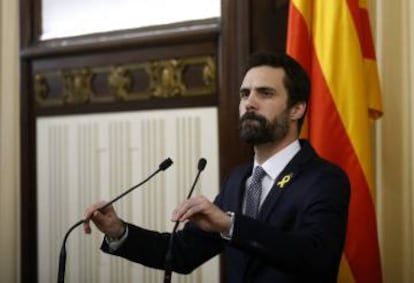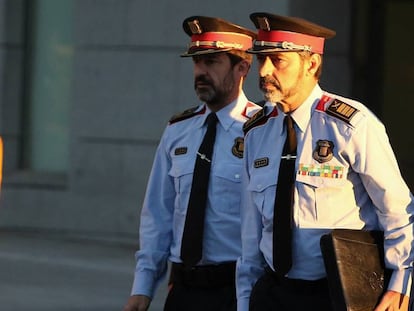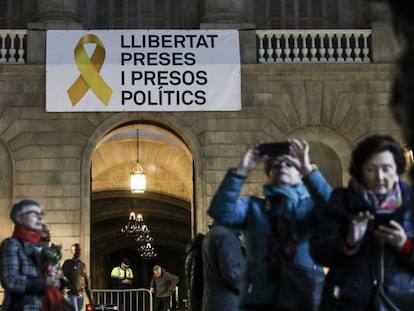Government moves to block Puigdemont meeting with Catalan speaker
Under Article 155, Madrid says it has powers over the region’s headquarters in Brussels

The Spanish government has said it will stop ousted Catalan premier Carles Puigdemont from entering the headquarters of the Catalan government in Brussels, in order to prevent his scheduled meeting with Roger Torrent, the new speaker of the Catalan parliament, from going ahead. The Spanish government, using emergency powers provided by the application of Article 155 of the Constitution, announced it will ask private security to block Puigdemont from entering the building. On the decision, Prime Minister Mariano Rajoy said: “I see nothing wrong with it.” As a result, the meeting between Puigdemont and Torrent was moved to the Brussels headquarters of the European Free Alliance.
Security officials on the border have been told to “be very attentive to the inside of vehicles”
The move comes as the Spanish government steps up security to ensure Puigdemont does not make a laughing stock out of state police controls by returning incognito to the country, or by appearing in the Catalan regional parliament. “We are going to make sure that he does not enter – not even in the trunk of a car,” Interior Minister Juan Ignacio Zoido said on Tuesday. As part of the clampdown, security along the border with France has been stepped up. Zoido also said that state security forces are keeping Spanish prosecutors updated with information and will closely follow Puigdemont’s movements to stop him from “crossing the border in helicopter, by boat or in the trunk of a car.”
Zoido went on to say that his department is “very concerned” about Puigdemont sneaking back into Spain.

The sacked premier fled to Belgium on October 30 to avoid charges of sedition for his involvement in the unilateral declaration of independence in Catalonia. From Brussels, Puigdemont campaigned as leader of the pro-independence Junts per Catalunya party in the December 21 snap elections, which were called by Madrid using the powers it has under Article 155. The group won the second-highest number of votes and seats in the Catalan parliament, and on Monday, parliament speaker Roger Torrent stated that the sacked premier was the “only candidate” for premiership. But parliamentary bylaws expressly forbid a premier from being sworn in remotely, meaning Puigdemont would need to physically appear before the Catalan parliament for the investiture to be valid.
On a recent trip to Copenhagen – his first foray outside Belgium since fleeing – Puigdemont spoke of the possibility of “returning without risk” to Spain to be sworn in as premier of the Catalan parliament on January 31. “Democracy cannot exist without laws,” he said at a press conference, “but not without citizen participation either.”
We are going to make sure that he does not enter – not even in the boot of a car
Juan Ignacio Zoido
Zoido said Puigdemont’s “irresponsible conduct” was reaching “unimaginable limits,” and that with a person like him “you don’t know what they could do.” The minister told Spanish broadcaster Antena 3 that Puigdemont should “leave the circus and think about what matters to all Catalans.”
Zoido explained that if Puigdemont refuses to hand himself over to police “there will be another candidate for the premiership because institutional normality has to be recovered.” The Spanish government has maintained that it will oppose any illegal mechanism to swear in Puigdemont, be it remotely or by delegating votes. “There is no alternative to the law,” said Rajoy.
Meanwhile, Puigdemont’s party Junts per Catalunya has withdrawn its request to delegate votes, arousing suspicions that the ousted premier is planning to return to Spain.
Dozens of police and Civil Guard officers were sent to strengthen security at the border over fears Puigdemont would make a “special appearance” at the end of the electoral campaign in December.
Police officers sent to guard the border with France told EL PAÍS that they had not received expressed orders to “open car trunks or hoods” but were told to “be very attentive to the inside of vehicles.”
Police reinforcements
Police sources along the border say that security has also been increased at points away from the border: “More controls have been placed along highways,” for instance in the La Pobla de Segur zone or Puigcerdà in Girona.
Also, since yesterday, three police intervention vans have been parked in front of the Catalan parliament in the Ciutadella park. According to the spokesperson of the National Police in Catalonia, the vans are part of the “security operation” organized for when the next Catalan premier is sworn in. They will remain in place until January 31, according to police sources. Up until now, Catalonia’s regional police force, the Mossos d’Esquadra, have been the only security forces sent to the Ciutadella park. The National Police did not confirm whether the operation is exclusively to stop the return of Puigdemont, who left with the help of a Mossos sergeant and continues to be accompanied by him.
English version by Melissa Kitson.
Tu suscripción se está usando en otro dispositivo
¿Quieres añadir otro usuario a tu suscripción?
Si continúas leyendo en este dispositivo, no se podrá leer en el otro.
FlechaTu suscripción se está usando en otro dispositivo y solo puedes acceder a EL PAÍS desde un dispositivo a la vez.
Si quieres compartir tu cuenta, cambia tu suscripción a la modalidad Premium, así podrás añadir otro usuario. Cada uno accederá con su propia cuenta de email, lo que os permitirá personalizar vuestra experiencia en EL PAÍS.
En el caso de no saber quién está usando tu cuenta, te recomendamos cambiar tu contraseña aquí.
Si decides continuar compartiendo tu cuenta, este mensaje se mostrará en tu dispositivo y en el de la otra persona que está usando tu cuenta de forma indefinida, afectando a tu experiencia de lectura. Puedes consultar aquí los términos y condiciones de la suscripción digital.










































